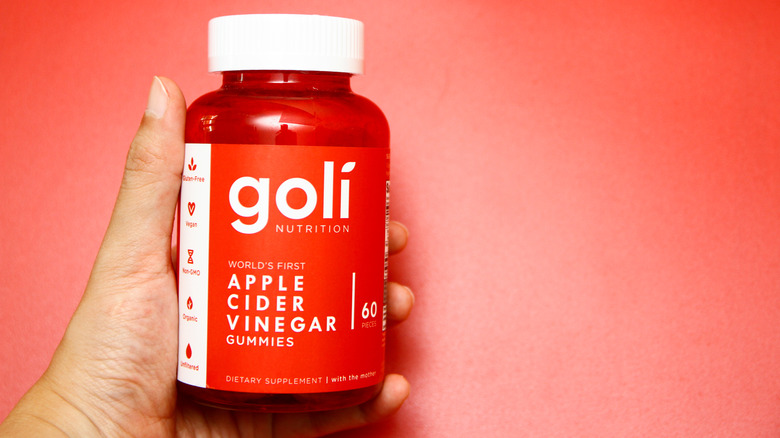Medications That Could Have Negative Interactions With Apple Cider Vinegar
We've all heard of the saying, "An apple a day keeps the doctor away." Well, many have turned to apple cider vinegar (ACV) to reap a variety of health benefits. Not only can you get ACV in a bottle at your grocery store, but it's available in gummies if you don't like the taste. According to Healthline, researchers believe that the acetic acid in ACV not only gives it that recognizable smell and flavor, but is also responsible for its health benefits. Some evidence suggests that ACV has anti-bacterial properties and may help with weight loss and help lower blood sugar, although more research is needed.
A study published in the Journal of Food Biochemistry showed that including ACV as a regular part of your diet may be effective against neurological complications like those seen in Alzheimer's disease. When it comes to doing something good for your health like taking a natural remedy or supplement, it's easy to not think about the side effects. Although ACV may improve your health, it can also interact negatively with certain medications.
Apple cider vinegar can negatively interact with some medications
As previously mentioned, ACV has blood sugar lowering effects that can help people manage diabetes. However, according to Healthline, taking ACV along with insulin or diabetes medications that stimulate insulin production can cause blood sugar levels to drop too low. According to the American Diabetes Association, sulfonylureas and meglitinides like Starlix stimulate the release of insulin and can cause hypoglycemia (low blood sugar). Adding ACV could make matters worse.
Digoxin, which may be known under the brand name Lanoxin or Lanoxicaps, is a medication used to treat heart failure by affecting potassium and sodium levels, according to WebMD. Taking Digoxin along with ACV may cause potassium levels to get too low, per Healthline. Low potassium levels can cause hypokalemia which can interfere with the electrical signals that the nerves and the heart need to function (via Mayo Clinic).
According to Harvard Health Publishing, thiazide diuretics like Esidrix help with lowering blood pressure, but they cause potassium loss. These medications can lead to muscle weakness, cramping, and an abnormal heartbeat if potassium levels get too low. Large amounts of ACV should be avoided if you're taking these diuretics (via Healthline).
Before starting any new supplement or remedy, you should always check with your doctor or pharmacist for any negative drug interactions.


